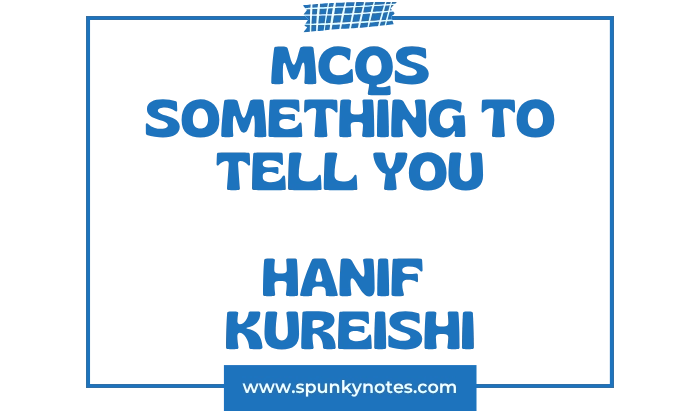

Estimated Reading Time: 16 min
Something to Tell You MCQs
1. What is Jamal Khan’s primary profession?
A. Film writer
B. Psychoanalyst
C. Library worker
D. Theatre director
2. What major historical event does Jamal live with daily?
A. A terrible flood
B. A real murder
C. His divorce
D. A financial scam
3. Why does Jamal prefer patients to lie on the couch?
A. For better dreams
B. To promote relaxation
C. Freud disliked staring
D. It is an old tradition
4. What is Henry Richardson’s professional identity?
A. Eminent painter
B. Psychoanalyst
C. Theatre director
D. War reporter
5. What part of a theatre trip did Miriam enjoy the most?
A. The applause
B. The intervals
C. The actors’ faces
D. The first act
6. What happened to Henry within fifteen minutes of a play starting?
A. He praised it
B. He fell asleep
C. He stood up
D. He started shouting
7. What did Henry call the London area near Hammersmith?
A. The cultural wasteland
B. A Middle Eastern city
C. The ghetto
D. A dangerous area
8. Why did Henry turn down an OBE?
A. He disliked the queen
B. He feared respectability
C. He wanted more money
D. He preferred fame
9. What materials did Henry use for his sculptures?
A. Old plastic, wire
B. Egg-boxes, Polyfilla
C. Marble and stone
D. Wood and oil
10. According to Henry, what is the only negation of murder?
A. Love and peace
B. Justice
C. Culture
D. Money
11. How does Henry distinguish between love and desire?
A. Love is intellectual
B. Desire is safety
C. Desire is foul
D. Love is better
12. What does Maria fear Henry is truly suffering from?
A. A terrible divorce
B. Career disaster
C. Terrible humiliation
D. Alcoholism
13. Why did Lisa leave the Opera House during the show?
A. She felt giddy
B. She found it boring
C. She was too hungry
D. She received a call
14. What activity did Henry often overhear his son Sam doing?
A. Studying late
B. Playing loud music
C. Making love
D. Crying softly
15. What did Henry call the Mule Woman walking in her dressing gown?
A. A true angel
B. Helen of Troy
C. A sad actress
D. A film director
16. What old conflict did Henry compare the clash of civilisations to?
A. Wealth and poverty
B. Puritans and liberals
C. Mèn and women
D. Writers and actors
17. What did Josephine often use to communicate her difficulties?
A. Shouting
B. Writing letters
C. Her ailments
D. Silent treatment
18. What was Rafi’s temporary nickname for Jamal?
A. Sad fat man
B. Mr. Cunty Cunt
C. The mind doctor
D. Old dude
19. Which publication did Rafi choose as his favourite book at school?
A. Aristotle
B. Argos catalogue
C. Bible
D. Freud
20. What did Jamal conclude was the ultimate freedom?
A. Accepting obligation
B. Sexual liberty
C. Being respected
D. Financial success
21. What did Jamal compare Freud’s idea of repetition to?
A. Daemonic death
B. A boring song
C. True happiness
D. A love letter
22. What was the father’s profession of Miriam’s first child?
A. A doctor
B. A policeman
C. A cabdriver
D. A postman
23. What was Bushy’s previous job before becoming a cabbie?
A. A burglar
B. A postman
C. A bus driver
D. A cleaner
24. What anatomical feature did Bushy fear was transforming?
A. His long eyebrow
B. His nose
C. His large chin
D. His tiny ears
25. What questionable product did Miriam and Jamal sell for profit?
A. Stolen art
B. Turgeniev vodka
C. Chinese furniture
D. Broken washing machines
26. What term did Miriam use to describe Jamal’s patients?
A. Egotists
B. The sane
C. The afflicted
D. Nutters
27. What did Miriam value more highly than books?
A. Quiet time
B. Hard work
C. Experience
D. Family time
28. What insult led Father to return permanently to the subcontinent?
A. A racist comment
B. Being betrayed
C. Loss of his job
D. His wife’s anger
29. What did Father call Karachi, Pakistan?
A. The family home
B. The new country
C. An angry place
D. Bombay’s shadow
30. What unusual canned food did Father request from Britain?
A. Fresh fish
B. Corned beef
C. Baked beans
D. Condensed milk
31. What academic requirement was Ajita fulfilling by taking philosophy?
A. An arts degree
B. Another module
C. A legal test
D. A fun class
32. How was Ajita’s father exposed in a documentary?
A. As a Marxist
B. As a greedy villain
C. As a hero
D. As an artist
33. What item did Ajita use to barricade her door against her father?
A. A wooden wedge
B. A large mirror
C. A strong chain
D. Her body
34. Who did Ajita initially blame for her father’s death?
A. Jamal
B. Wolf
C. The strikers
D. A heart attack
35. What sharp tool did Jamal take to Ajita’s house?
A. A garden trowel
B. A mother’s knife
C. A broken razor
D. A carving fork
36. What was the title of Mustaq’s song dedicated to Jamal?
A. Heart Torn Apart
B. Thin White Duke
C. Mad Professor
D. I Love You
37. What future job did Mustaq reveal he wanted as a teenager?
A. Film director
B. Fashion designer
C. Restaurant owner
D. Accountant
38. What was Wolf and Valentin’s plan after leaving London?
A. Buy a house
B. Work on boats
C. Become journalists
D. Start a business
39. What happened to Valentin, Jamal’s friend, after the incident?
A. Became a teacher
B. Committed suìcide
C. Travelled the world
D. Married Ajita
40. Where did Jamal read Philosophical Investigations during his commute?
A. On the train
B. In the library
C. At the college
D. In the pub
41. What classic book did Jamal hide under his bed?
A. The Ego and Id
B. The Interpretation of Dreams
C. Civilisation and Discontents
D. The Three Essays
42. What was Tahir Hussein’s nationality and religion?
A. British Muslim
B. Indian Hindu
C. Pakistani Muslim
D. German Jew
43. What did Tahir Hussein say swallowed psychoanalysis like a minnow?
A. Philosophy
B. Mathematics
C. Literature
D. Poetry
44. What sudden physical reaction did Jamal experience after his first session?
A. Uncontrolled defecation
B. Miraculous healing
C. Sexual excitement
D. Extreme calm
45. What realisation did Karen have about their relationship?
A. He was kind
B. He was too selfish
C. He loved Ajita
D. He was too busy
46. Why did Karen say she only married the wrong person?
A. She needed stability
B. Jamal made her second-best
C. She hated London
D. For quick revenge
47. What gift did Mustaq give Ajita for her birthday?
A. A valuable watch
B. A designer dress
C. A holiday to Venice
D. A new car
48. Who organised Wolf’s body transport after he died in Soho?
A. Ajita’s husband
B. Jamal’s sister
C. Mustaq’s office
D. The police
49. What creature did Dante compare the “inveterate wolf” to in Jamal’s thought?
A. A bottomless maw
B. A cowardly lion
C. A sly jackal
D. A roaring tiger
50. How did Henry characterise Miriam’s desire to appear on TV shows?
A. Vulgar and idiotic
B. Brave and original
C. Necessary work
D. Great journalism
Brief Overview
Something to Tell You is a novel by Hanif Kureishi, published in 2008. The book directly engages with psychoanalytic concepts such as the unconscious, trauma, memory, and the process of making the unconscious conscious to achieve resolution.
The novel is about Jamal, a psychoanalyst who carries a heavy, old secret about a murder. Years ago, when Jamal was a student, he and his friends, Wolf and Valentin, confronted Ajita’s abusive father. They intended only to scare him, but the father died from a heart attack during the confrontation.
Jamal tries to live a quiet life now as a psychoanalyst, divorced from Josephine, with a son named Rafi. His sister, Miriam, starts an unusual love affair with Henry, a famous theatre director.
The past violently returns when Wolf reappears and threatens to reveal Jamal’s murder secret. Wolf, who is obsessed with the old crime, suddenly dies while staying at Ajita’s house. Jamal talks with Ajita about the death and their shared past.
Ajita forgives Jamal for his part in the event. She also confesses that she had secretly wished her abusive father would die. Jamal resolves to focus on being a good father to Rafi. He decides to concentrate on his work and write a book about guilt and conscience, seeking to understand his difficult life fully.

